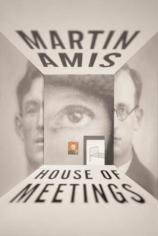House of Meetings
Review
House of Meetings
How
can a novel whose central setting is the Russian Gulags of 1956 and
whose central theme is death be so relentlessly vibrant?
The title of Martin Amis's HOUSE OF MEETINGS refers to a designated
place of assignation for men in slave camps and the few wives who
would make the journey to spend a night with them. It's not much
more than a rude hut, furnished with such luxuries as "two
fist-sized lumps of bread, a whole herring (slightly green around
the edges), and the big jug of cold broth with at least four or
five beads of fat set into its surface."
It is here that the narrator's younger brother Lev will meet his
wife Zoya, here where Amis has chosen to personify the spiritual
death of Russia. From the outset we know that something
happens here that night, and the author dangles this knowledge in
front of us in the form of a letter from brother Lev, which the
narrator has yet to open.
The novel takes the form of a long detailed missive from the
narrator to his American stepdaughter Venus, written from a 2004
"gulag cruise" on the Yenisei River. His own death seems imminent
and even welcome. He's a hard man --- one who has killed and raped
in the course of World War II --- but he's also a man who loves.
The woman he loves is Zoya, the unconventional Jewess who marries
his brother. He recalls meeting her in 1946, when she was an
unmarried 19-year-old of dubious reputation. "My first thought was
not the first thought I was used to --- some variant of When
can I wrench her clothes off? No. It was this (and the
sentence came to me unbidden and fully formed): How many poets
are going to kill themselves because of you?"
The story of this love triangle supports the novel, carrying us
through the stages of the lives of the three, beyond the revolt
that ends the brothers' imprisonment in the Norlag slave camp, into
quotidian compromises of post-gulag life --- the making of money,
divorces and marriages. Lev remarries after Zoya leaves him, and
has a son, whose death in a senseless battle in Afghanistan excises
what is left of Lev's will to live. Our narrator has a few years'
marriage to an English woman and becomes a shameless Anglophile
(thus conveniently explaining his ardent grasp of the English
language.)
When Lev dies, he takes it upon himself to inform Zoya, who is by
this time alcoholic and married to a much-older playwright. Suffice
it to say that what transpires between them is something our
narrator feels he must ask his stepdaughter's forgiveness for. And
of course, before the book ends, he opens the letter from his
brother that tells what happened at the House of
Meetings.
Russia itself is dying slowly, the narrator tells us, and Amis's
characters, language and details all serve this relentless
conclusion. I felt horror at his descriptions of the slave camps
and their wars between "the brutes and the bitches," but I also
felt awe at the writing itself. Amis has structured this short
novel so that it hits you from all sides, with pieces from the
present and the past coming not in chronological order (though
somehow it is not confusing). Amis incidentally sends you to the
dictionary more than once, which the narrator winks at several
times. "Now the gravamen. Hie thee to the dictionary --- that's a
good girl. Remember: every visit adds another gray cell."
The cozy, avuncular tone of an old man addressing his stepdaughter
for the last time adds to the intimacy and believability of the
characters. And, for me, the excellence of the writing more than
makes up for the somber subject matter.
I am a fan of Amis's work, and I think this is his best book yet.
It is certainly one that I will read again.
Reviewed by Eileen Zimmerman Nicol on January 22, 2011
House of Meetings
- Publication Date: January 16, 2007
- Genres: Fiction
- Hardcover: 256 pages
- Publisher: Knopf
- ISBN-10: 1400044553
- ISBN-13: 9781400044559





